UK ConLib Government to Use INFLATION Stealth Tax to Erode Value of Public Debt
Economics / UK Debt Jun 29, 2010 - 01:37 AM GMTBy: Nadeem_Walayat
 The Chancellor of the Exchequer, George Osborne hit the reset button on the UK economy by delivering the most radical budget of the past 30 years that has sought to cut an extra £40 billion from Britains annual budget deficit by 2014-15 which is on top of ALL of Labours March 2010 budget cuts and tax rises of £73 billion that the coalition left intact. The cuts totaling a withdrawal of £113 billion from the economy will be phased in by 2015-16 and by then total about 7.5% of GDP which is a huge amount that is deemed necessary to divert Britain from its current path towards bankruptcy that Labour had put it firmly upon as a consequence of running an annual budget deficit of 12% of GDP.
The Chancellor of the Exchequer, George Osborne hit the reset button on the UK economy by delivering the most radical budget of the past 30 years that has sought to cut an extra £40 billion from Britains annual budget deficit by 2014-15 which is on top of ALL of Labours March 2010 budget cuts and tax rises of £73 billion that the coalition left intact. The cuts totaling a withdrawal of £113 billion from the economy will be phased in by 2015-16 and by then total about 7.5% of GDP which is a huge amount that is deemed necessary to divert Britain from its current path towards bankruptcy that Labour had put it firmly upon as a consequence of running an annual budget deficit of 12% of GDP.
Eventually an annual £113 billion (7.5% of GDP) being sucked out of the economy will undoubtedly have a significant impact on the economy thus resulting in lower economic growth than originally forecast in my UK Economic growth forecast of December 2009 (31 Dec 2009 - UK Economy GDP Growth Forecast 2010 and 2011, The Stealth Election Boom ) as illustrated by the below graph that will now require amending.
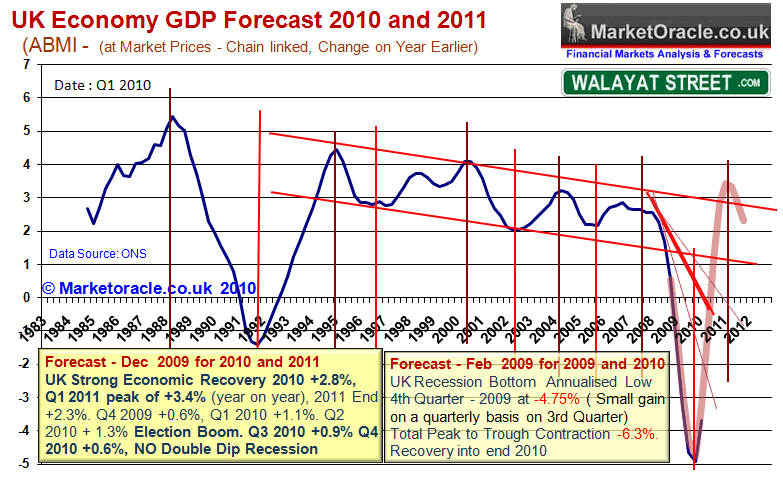
Double Dip Recession?
The cost of the governments deficit reduction strategy is clearly that of lower economic growth, which the mainstream press has already concluded in large part signifies a double dip recession (a decline in GDP for 2 or more consecutive quarters) during 2010-2011 is increasingly becoming probable as illustrated by many highly read columnists / economists in the mainstream press :
The Independant - 27th June 2010 - Osborne's first Budget? It's wrong, wrong, wrong!
Joseph Stiglitz, the Nobel prizewinner who predicted the global crisis, delivers his verdict on the Chancellor's first Budget and tells Paul Vallely it will take the UK deeper into recession and hit millions – the poorest – badly
Professor Joseph Stiglitz, who has been described as the biggest brain in economics, is distinctly unimpressed by George Osborne's strategy. This, he predicts, will make Britain's recovery from recession longer, slower and harder than it needs to be. The rise in VAT could even tip us into a double-dip recession.
Daily Record - 28th June 2010 - BlanchFlower Warns of Double Dip Recession or Worse
David Blanchflower, a former member of the Bank of England's monetary policy committee, said Osborne had failed to heed warnings, from US president Barack Obama and others, that withdrawing fiscal stimulus too soon could endanger recovery.
Blanchflower, who was seen as a left-wing influence on the Bank's committee, said: "I am now convinced that as a result of this reckless Budget the UK will suffer a double-dip recession or worse."
Guardian - 22nd June 2010 - Budget 2010: Fears tough budget could plunge UK back into recession
There were warnings tonight that the toughest budget in decades could plunge Britain back into recession, leaving the private sector unable to create the jobs needed to make up for public sector cuts.
Whilst double dip recession talk rages in the press, however the advantage the UK has over many European countries is in its ability to devalue the exchange rate to boost growth and by keeping interest rates at near zero regardless of the fact that the inflation rate has been above the banks upper limit of 3% now for 6 months. This coupled with the nuclear option of printing money which the Bank of England will likely deploy again ensures that the actual risk of a double dip recession materialising is far less probable than the headlines imply.
Dealing with Labours Debt and Deficit Legacy
My existing long standing annual budget deficit projections as illustrated by the below graph dating back to November 2008 (Bankrupt Britain Trending Towards Hyper-Inflation?) now need to be scrapped to take into account of the new government having hit the reset button and set its own targets for annual budget deficits and total accumulated debt which have now been accompanied with actual detailed budgetary measures such as the VAT hike to 20%, and social benefits bill cut of £12.5 billion that form a mostly credible programme for deficit reduction, something that the last Labour government NEVER produced during the whole of the preceding 2 years.
Labours Last Budget (March 2010) Deficit Reduction Targets
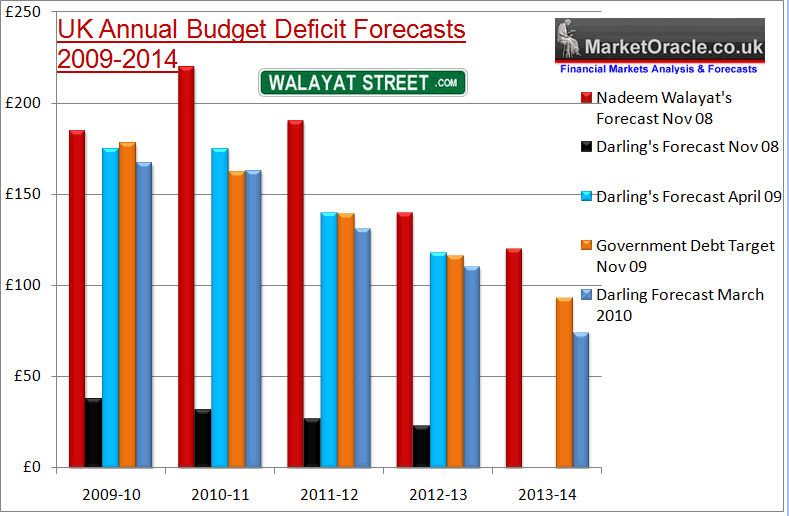
Labours plan was never credible because according to Labours own forecasts an additional £478 billion would have been borrowed over the next 4 years that would have been ADDED to the total accumulated debt at the end of 2009-10 of £784 billion, therefore according to the Labour government total public sector net UK debt by the end of 2013-14 would have increased from 60% of GDP to 80% of GDP (after allowing for economic growth of 1.5% to 2%) i.e. total debt would have increased to around £1.26 trillion even IF Labour had been able to stick to its targets as illustrated by the below graph
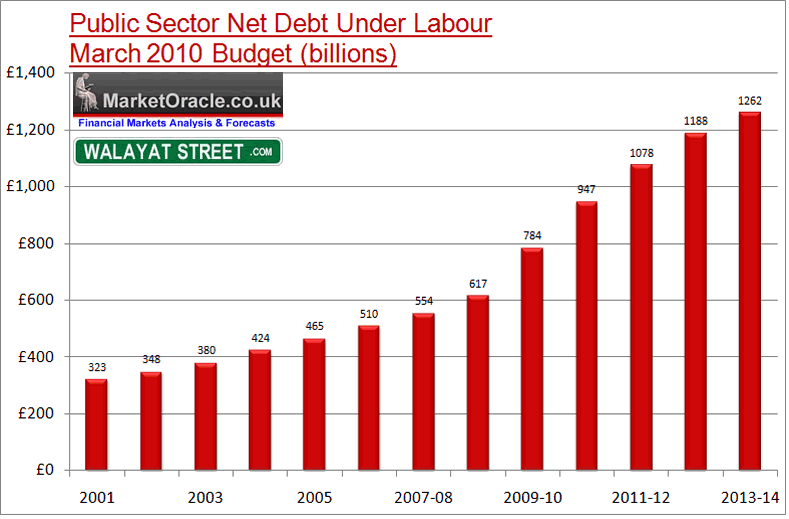
Actual Labour government debt would have been at least £100 billion higher than Labours March 2010 forecast, as my earlier graph illustrates that Labour has consistently failed to meet its budget targets therefore actual total public sector net debt by 2013-14 would have been £1.4+ trillion or about 88% of GDP.
However on top of public debt, total liabilities continue to target approx £4.5 trillion by 2013-14, (as illustrated by the below graph which was last updated in May 2009), this is despite George Osbourne's emergency deficit cutting budget as a consequence of the latest projections for public sector pensions and european debt default risks, given another financial crisis total liabilities could yet look set to be even higher. All of this is a sitting time bomb that will explode in the government bond markets which will send interest rates sharply higher as illustrated in the Inflation Mega-trend Ebook. The trigger for which could be a string of chain reaction European sovereign debt defaults, regardless of the new governments own programme for deficit reduction which still does nothing to actually halt accumulation of new debt.
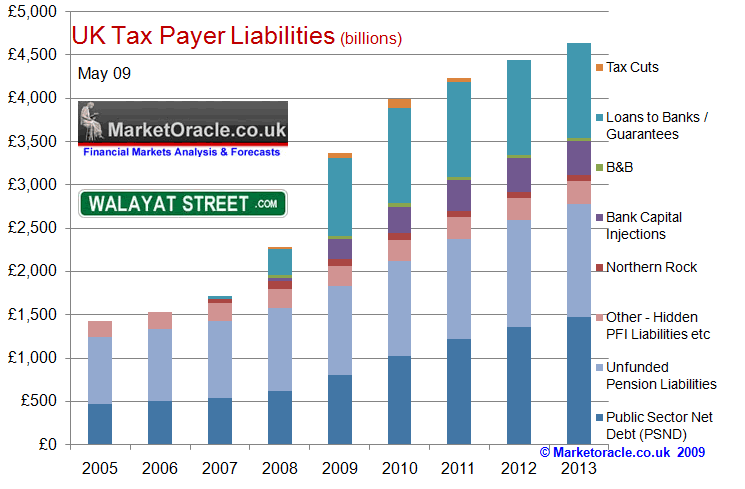
Con-Lib Coalition Government Budget Deficit Reduction Strategy
The ConLib government has announced that they will reduce the annual budget of £156 billion to £20 billion by 2015-16. My own interpretation is that higher unemployment as a consequence of between 500,000 and 700,000 public sector job losses to be announced in September 2010 will mean significantly lower economic growth during the next 4 years than that which the government is presently forecasting which means that the deficit will likely be significantly higher later in the cycle i.e. as the job losses take place, with UK unemployment possibly rising towards 3 million.
The ConLib governments annual budget deficit forecasts as a consequence of phasing in of spending cuts and tax rises are:
- 2009-10 : £154.7bn - Actual.
- 2010-11 : £149bn
- 2011-12 : £116bn
- 2012-13 : £89bn
- 2013-14 : £60bn
- 2014-15 : £35bn
- 2015-16 : £20bn
Key Problems with deficit reduction targets
1. Unemployment - Higher benefit payments as a consequence of higher unemployment as between 500,000 and 750,000 public sector workers lose their jobs over the next 4 years, the problem here is the culture and ethos of public sector workers means that most are unemployable in the far more flexible private sector unless they change their mindset. This suggests a cut in the benefits budget of £11 billion is going to be very hard to achieve, and more probably only to the tune of £7 billion per year by 2014-15.
2. Economic growth - will be significantly lower than even the revised forecasts that average 2.5% per year over the next 5 years, even a 0.5% reduction in annual growth will result in reduced government revenues of £3 billion per year against expectations for an average increase of of £15 billion per year.
3. Public Sector 25% Spending Cuts - The Government intends to target 25% of spending cuts across non ring fenced spending departments to culminate in an annual spending cut of £21 billion on top of Labours planned cuts of £20 billion. However the problem here is that spending cuts of 25% are just not possible in my opinion, especially as 1/3rd of the governments annual budget has been ring fenced for growth (NHS and Pensions) as the below graph illustrates -
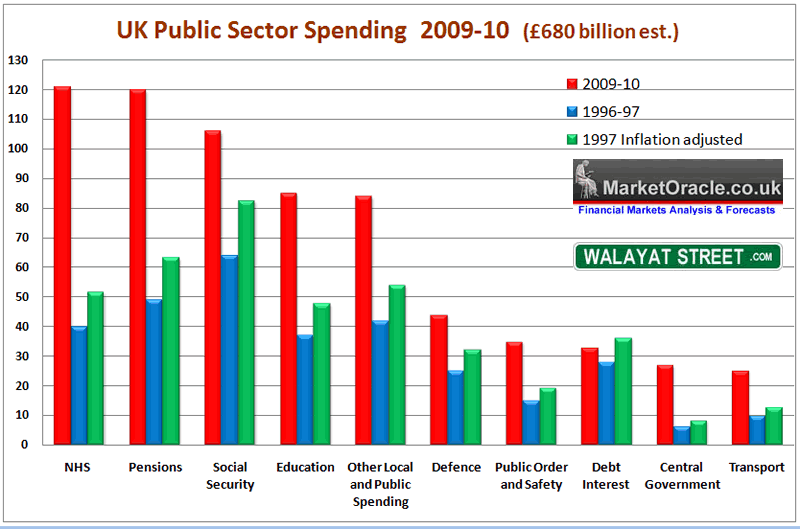
Therefore 10% to 15% is achievable but 25% ? This means that there exists an approx £15 billion annual hole in the governments plans or about £60 billion over the 4 years from 1st April 2011, which means higher borrowing and deficits than forecast, and also means that further tax rises and spending cuts are likely in future budgets which therefore implies approx. £30 billion of extra deficit.
4. Election Boom 2014-15 - During an election year the government will not seek to cut the deficit as the government forecasts but rather expand the deficit by at least £5 billion in an attempt to create an election boom. Therefore the deficit will spike higher during the election year.
Therefore it is difficult to see how the government will be able to achieve its stated budget reduction target of getting the annual deficit down to just £20 billion by 2015-16. Whilst the government is expected to trend close to target for the next 3 years, however thereafter the governments (OFBR) and my deficit forecasts diverge as the coalition governments primary focus will be towards getting re-elected in May 2015. In all likelihood this means that total debt will be over £100 billion higher than that which the government is forecasting as illustrated by the annual budget deficits forecast graph below-
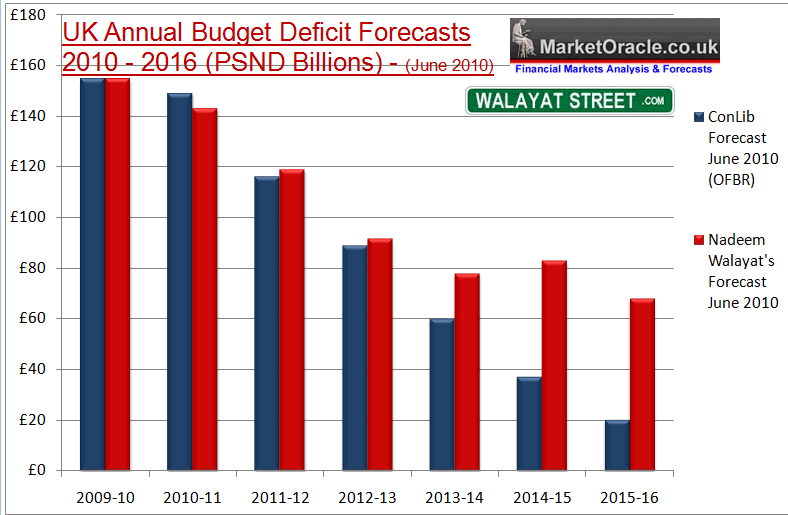
Whilst the ConLib's deficit reduction targets represent an improvement under the Labour governments target that would have resulted in extra borrowing of £478 billion over the next 4 years if the Labour government managed to stick to its targets. However the ConLib government will still expand total debt by £414 billion over the next 4 years, and £471 billion over the next 6 years to reach £1,242 billion, so hardly an earth shattering improvement.
So if the total public sector net debt is going to increase by £471 billion, how can the ConLib government prevent Britain from going bankrupt ?
The answer in one word is - INFLATION.
Inflation continues to run well beyond the Bank of England's 2% target at currently 3.4% CPI, and 5.1% RPI, inline with the UK inflation forecast for 2010 ( 27th December 2009 (UK CPI Inflation Forecast 2010, Imminent and Sustained Spike Above 3%). The ConLib governments and bank of England's objective remains to continue with the mantra of temporary inflation whilst all the time using inflation as one of its primary tools to stealthily erode the value of the annual deficit and total accumulated debt by stealthily taxing earnings and savings to ensure annual interest payments that are set to grow to £70 billion remain manageable in real terms.
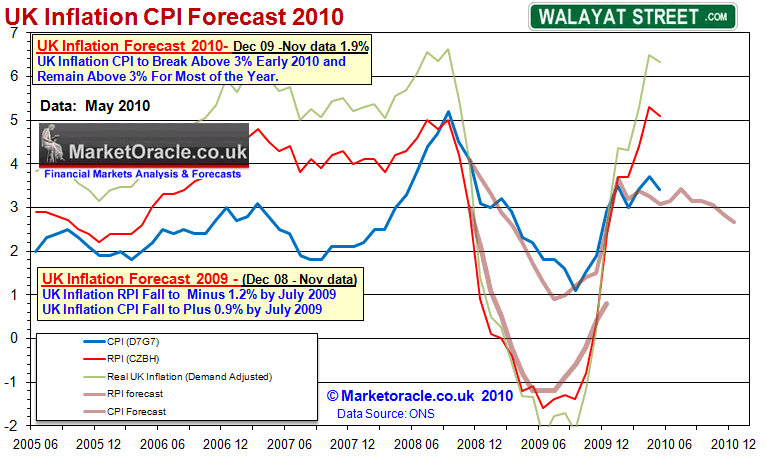
Inflation as illustrated at length in the INFLATION MEGA-TREND EBOOK (Free Download), is a powerful stealth tax that the new government will use to first stabilise and then reduce the debt in terms of percentage of GDP as the below graph illustrates that despite total debt increasing by 50% to £1.24trillion, the ConLib government aims to stabilise the debt at about 70% of GDP and then target a trend lower to about 65% of GDP by 2016. However my higher deficit projections imply that actual Debt % will start to deviate from the ConLib expectations during 2014.
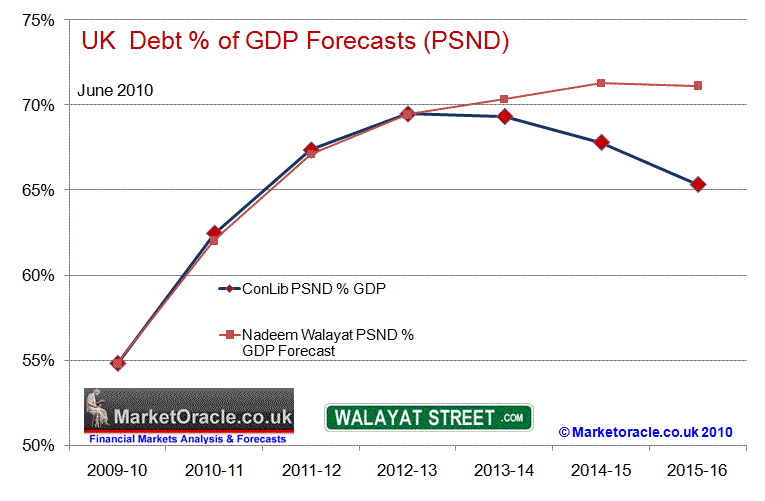
Again, inflation is the primary mechanism that will be used to erode the value of UK debt in real terms over the next 5 years by 15-20%. Therefore it is an imperative that savers and investors protect their wealth from the governments stealth tax as illustrated at length in the Inflation Mega-Trend Ebook.
This deficit and debt projection analysis will feed into my next in depth analysis that will seek to update the UK GDP growth forecast for at least the next 2-3 years (ensure you are subscribed to my always free newsletter to get this in your email in box).
Comments and Source : http://www.marketoracle.co.uk/Article20682.html
By Nadeem Walayat
Copyright © 2005-10 Marketoracle.co.uk (Market Oracle Ltd). All rights reserved.
 Nadeem Walayat has over 20 years experience of trading derivatives, portfolio management and analysing the financial markets, including one of few who both anticipated and Beat the 1987 Crash. Nadeem's forward looking analysis specialises on UK inflation, economy, interest rates and the housing market and he is the author of the NEW Inflation Mega-Trend ebook that can be downloaded for Free. Nadeem is the Editor of The Market Oracle, a FREE Daily Financial Markets Analysis & Forecasting online publication. We present in-depth analysis from over 500 experienced analysts on a range of views of the probable direction of the financial markets. Thus enabling our readers to arrive at an informed opinion on future market direction. http://www.marketoracle.co.uk
Nadeem Walayat has over 20 years experience of trading derivatives, portfolio management and analysing the financial markets, including one of few who both anticipated and Beat the 1987 Crash. Nadeem's forward looking analysis specialises on UK inflation, economy, interest rates and the housing market and he is the author of the NEW Inflation Mega-Trend ebook that can be downloaded for Free. Nadeem is the Editor of The Market Oracle, a FREE Daily Financial Markets Analysis & Forecasting online publication. We present in-depth analysis from over 500 experienced analysts on a range of views of the probable direction of the financial markets. Thus enabling our readers to arrive at an informed opinion on future market direction. http://www.marketoracle.co.uk
Disclaimer: The above is a matter of opinion provided for general information purposes only and is not intended as investment advice. Information and analysis above are derived from sources and utilising methods believed to be reliable, but we cannot accept responsibility for any trading losses you may incur as a result of this analysis. Individuals should consult with their personal financial advisors before engaging in any trading activities.
Nadeem Walayat Archive |
© 2005-2022 http://www.MarketOracle.co.uk - The Market Oracle is a FREE Daily Financial Markets Analysis & Forecasting online publication.
Comments
|
Alfred Warschauer
30 Jun 10, 00:06 |
Inflating away the debt
"The ConLib governments and bank of England's objective remains to continue with the mantra of temporary inflation whilst all the time using inflation as one of its primary tools to stealthily erode the value of the annual deficit and total accumulated debt by stealthily taxing earnings and savings to ensure annual interest payments that are set to grow to £70 billion remain manageable in real terms." Nadeem Does the above factor in that around 25% of gilts are indexed linked, so trying to "inflate" away the debt mountain becomes a self defeating exercise for HMG? regards Alfie |
|
Nadeem_Walayat
30 Jun 10, 08:56 |
Inflation
75% is not, 25% is but long-term (indexed capital on maturity) doubt if it makes any difference to the government of what matures in 20-40 years time. Inflation is being used to reduce the deficit, public 3 year wage freeze = 10% to 15% real terms CUT in wages, accumulates to more than £100 billion over 3 years. |
|
Martin Wolf
02 Jul 10, 04:36 |
The country isn't bankrupt
You don't seem to understand the difference between a country and a government. The country isn't bankrupt. Indeed countries as a whole are virtually never bankrupt. The private sector, in aggregate, is unquestionably solvent. Martin Wolf |
|
mark
02 Jul 10, 15:48 |
inflation or deflation
Hi Nadeem, I've long looked crosseyed at the deflation v inflation argument. And today I can see EW projections for gbp/usd are inflationary for the uk. But the argument that the public will oppose QE is strong. On this basis I suggest inflation can only continue in the short term? |
|
Nadeem_Walayat
02 Jul 10, 19:56 |
QE
The public don't even understand what QE is let alone oppose it. We are in an inflation mega-trend, the deflationists are deluded, i just can't understand how they can miss in your face INFLATION, i.e. UK CPI is 3.4%, U.S. is 2%, where is the deflation ????????? |
|
Nadeem_Walayat
03 Jul 10, 11:37 |
The country isn't bankrupt.
Hi I didn't say that the country was bankrupt or going to go bankrupt imminently or during the next 5 years, but it is on a trend towards bankruptcy as manifested be increasing total debt and liabilities, the consquences for which is high inflation, regardless of the Bank of Englands mantra of 'temporary' inflation. Best. Nadeem Walayat, |
|
Martin Wolf
03 Jul 10, 13:38 |
the country is not and cannot be bankrupt
As I said, your statement is false. The debt is (on a net basis) almost entirely owed by the country to itself. Thus net national debt is close to zero and the country is not and cannot be bankrupt. Inflation would largely be a way for debtor Britons to default on creditor Britons. It has nothing to do with national bankruptcy. Martin Wolf |
|
Nadeem_Walayat
04 Jul 10, 00:39 |
External debt
Hi I'm puzzled, you appear to be ignoring the approx £7 trillion of external debt, of which approx £4 trillion is with the banking sector against dubious valuation of bank assets. Britain could go bankrupt, the markets won't wait for public debt of 100% of GDP, they would dump UK assets sending sterling plunging (imports bill soaring) and bond yields soaring, bankruptcy would not be an orderly event it would be amidst an uncontrollable panic of a series of shocks. There are a number of ticking time bombs such as the public sector pensions deficit. The government has no choice but to get a grip on the budget deficit else the markets will force them to do so by means of demanding ever higher interest rates for UK bonds with the ultimate risk that the market stops buying gilts, then what happens ? 10% interest rates ? 20% ? Like I said before ultimate bankruptcy is not likely but the consequences of the trend towards bankruptcy is severe, i.e. high inflation, interest rates, and economic stagnation. Best Nadeem Walayat, |
|
Edward Cowan
23 Nov 10, 14:39 |
More proof of the UK plan to inflate away debt- National bonds
Hi Nadeem, Just to add to your great article r.e. UK inflation and government plans to use this to reduce our debt, I can show you some (hopefully) interesting evidence of this from NS and I (short for National Savings and Investments). This is 100% backed by the Treasury, and is a tax free way of saving, and is essentially a National Bank (check it out http://www.nsandi.com/home).
The evidence is here-one of their GREAT products of the last few years has been Index Linked Savings Certificates http://www.nsandi.com/savingneeds/taxfreeinvestments). These are tax free, and in the words of NS and I:
"Returns guaranteed to beat inflation, as measured by the Retail Prices Index, when held for at least a year. Choice of investment terms. Invest from £100 up to £15,000 in each issue tax-free."
Well, what a deal!
BUT
The first thing to note is the max amount you can save-£15,000. It used to be more, I had £60,000 in them last year. But all of this doesn't matter, because guess what! They are not longer currently offering this deal!!! That's right, the government owned and backed NS and I is no longer offering their tax free deal to match/beat the official RPI rate.
And we know why that is-because they know it's going to go off the scale and the government simply can't afford to pay this, it's too good a deal.
Hope you read this/find it helpful, please keep up the great work.
Ted
|
|
Nadeem_Walayat
23 Nov 10, 14:44 |
Index Linked Certificates
Hi Edward I wrote about the Coalition scrapping Index Linked Certiftcates in July ahead of sharply higher RPI during 2011 - 19 Jul 2010 - UK Government Pulls Plug on Savers Inflation Theft Protection NS&I Index Linked Certificates Also the certificates are / were £15k per issue, so your £60k is made up of 4 issues. Best NW |
|
jonnysingapore
23 Nov 10, 18:30 |
deluding the public
so true Nadeem. So long as people think their houses are still worth tonnes of money in number terms, they won't care about anything else. The fact that food and energy are going to reach excruciating prices while we trash our currencies is completely beyond them. Our real hope going forward is to embark on a large program of food production and domestic shale gas production aswell as thorium based nuclear energy. Only then can we hope to control prices. With Japan having to go to the external market for debt in the next couple of years I feel and fear we have seismic shifts ahead of us. Not a pleasant feeling. |
|
Nadeem_Walayat
24 Nov 10, 00:40 |
Japan is bankrupt
Yes, Japan is bankrupt, this whilst so called analysts are recommending japan as a buy ???? It already has 200% Debt to GDP, and it is IN deflation whcih means the value of th debt goes UP as GDP contracts ! Japan is bankrupt, its just that they don't realise how f'ed they really are ! Or maybe they do its just everyone else (outside Japan) just looks at tokyo and thinks all of japan is the same. I will write an article on this because it is important. Japan is going the way towards becoming a third world country, lets hope UK and US don't follow ! |
|
Dave
26 Nov 10, 03:09 |
Pound/US$ exchange rate and 2012 Olympics
Hi Nadeem, How do you see the pound/us$ rate in the coming 2011-2012 olympics in london? How would such an event affect the currency exhange rate and what happens right after the Olympics? Sincerely, David |



